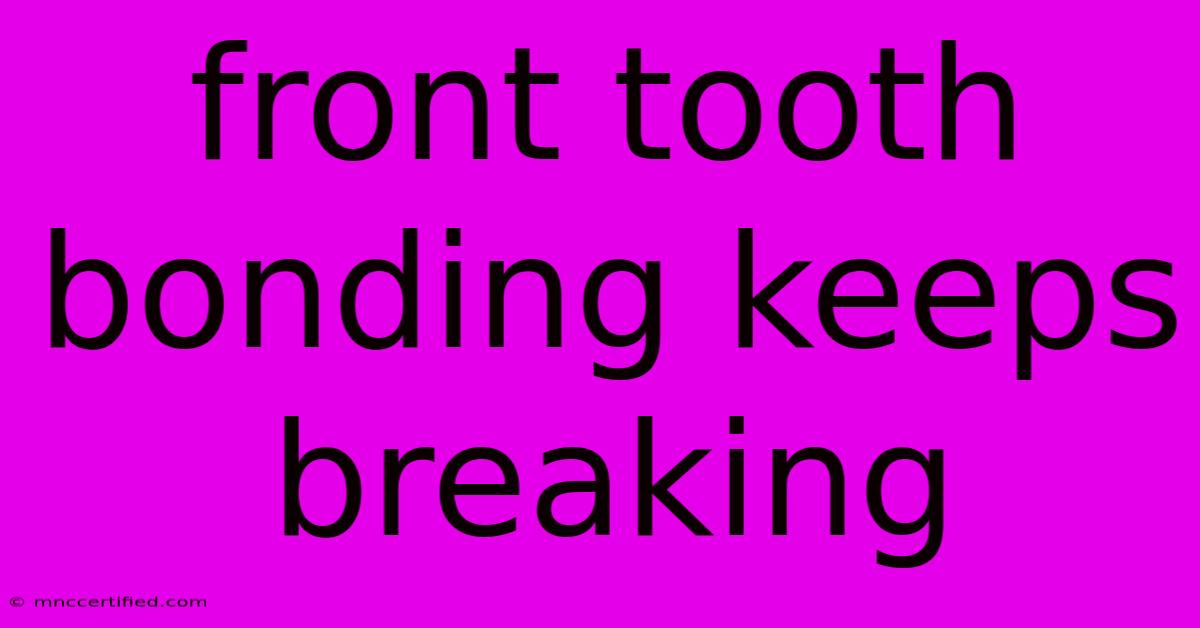Front Tooth Bonding Keeps Breaking

Table of Contents
Front Tooth Bonding Keeps Breaking: Causes & Solutions
Have you invested in dental bonding to enhance your smile, only to find it keeps chipping or breaking? It's frustrating, especially when you want a beautiful, long-lasting solution. Don't worry, you're not alone! This common issue can be addressed with the right understanding of the causes and available solutions.
Why Does My Front Tooth Bonding Keep Breaking?
Several factors can contribute to the breakage of front tooth bonding. Let's explore the most common culprits:
1. Inadequate Preparation:
- Poor Etching: Bonding relies on a strong bond with your natural tooth enamel. Improper etching, which roughens the surface to create a grip, can weaken the adhesion.
- Insufficient Bonding Agent: Using too little bonding agent can result in a weak bond and increased susceptibility to breakage.
- Inadequate Curing: Incomplete curing of the bonding material leads to a soft, brittle bond that easily chips or breaks.
2. Tooth Grinding or Clenching (Bruxism):
- Excessive Force: Nighttime grinding or clenching applies immense pressure on your teeth, putting your bonding at risk. The constant force can wear down the bonding material, leading to chips or cracks.
- Jaw Misalignment: A misaligned jaw can contribute to grinding and clenching, further exacerbating the issue.
3. Incorrect Bonding Application:
- Thin Bonding Material: Applying a thin layer of bonding material can make it more fragile and prone to breakage.
- Poorly Shaped Bonding: An uneven or poorly sculpted bonding can create stress points, making it more vulnerable to damage.
4. Lifestyle Factors:
- Hard Foods: Biting into hard foods like nuts, ice, and hard candies can exert significant force on your teeth, leading to bonding breakage.
- Aggressive Brushing: Using a hard-bristled toothbrush or brushing too vigorously can wear down the bonding over time.
Solutions to Prevent Bonding Breakage
Now that you know the potential causes, let's look at practical solutions to keep your front tooth bonding intact:
1. Consult Your Dentist:
- Professional Assessment: Schedule a consultation with your dentist to identify the specific cause of your bonding breakage.
- Rebonding: Your dentist can rebond the damaged area using a fresh layer of bonding material for a stronger, more durable repair.
- Alternative Options: If rebonding proves ineffective, your dentist might recommend other restorative options like veneers or crowns.
2. Practice Good Oral Hygiene:
- Gentle Brushing: Opt for a soft-bristled toothbrush and brush gently with a fluoride toothpaste.
- Flossing Regularly: Flossing removes plaque and food debris that can contribute to tooth decay and weaken your bonding.
- Mouthguards: If you grind or clench your teeth, consider wearing a custom-made mouthguard at night to protect your teeth and bonding.
3. Lifestyle Adjustments:
- Avoid Hard Foods: Limit your consumption of hard foods that can put excessive force on your teeth and bonding.
- Use a Bite Guard: A bite guard can protect your teeth from grinding and clenching, preserving your bonding.
4. Maintain Regular Check-ups:
- Preventive Care: Visiting your dentist for regular check-ups allows them to monitor your bonding and address any issues before they become severe.
Choosing a Skilled Dentist for Bonding
Selecting a skilled and experienced dentist for bonding is crucial. Look for dentists with a proven track record in cosmetic dentistry and restorative procedures. Ask for referrals from friends and family or search online for dentists specializing in bonding.
Final Thoughts
Front tooth bonding breakage can be a frustrating experience, but with the right understanding and proactive approach, you can prevent it. By following these tips, you can ensure a lasting and beautiful smile that you can confidently flaunt. Remember, your oral health is paramount, so don't hesitate to consult your dentist if you have any concerns.

Thank you for visiting our website wich cover about Front Tooth Bonding Keeps Breaking. We hope the information provided has been useful to you. Feel free to contact us if you have any questions or need further assistance. See you next time and dont miss to bookmark.
Featured Posts
-
Polymarket Ceos Home Raided By Fbi
Nov 15, 2024
-
Polymarket Ceos Apartment Raided By Fbi
Nov 15, 2024
-
Aus Vs Pak 1st T20 I Highlights Australia Wins By 29 Runs
Nov 15, 2024
-
John Lewis Unveils 2024 Christmas Advert
Nov 15, 2024
-
Nations League Greece Vs England Live Updates
Nov 15, 2024